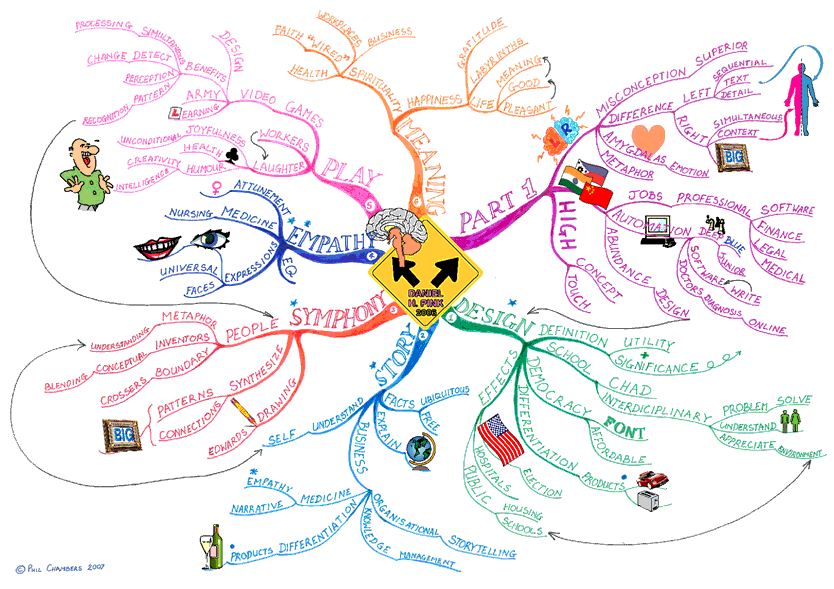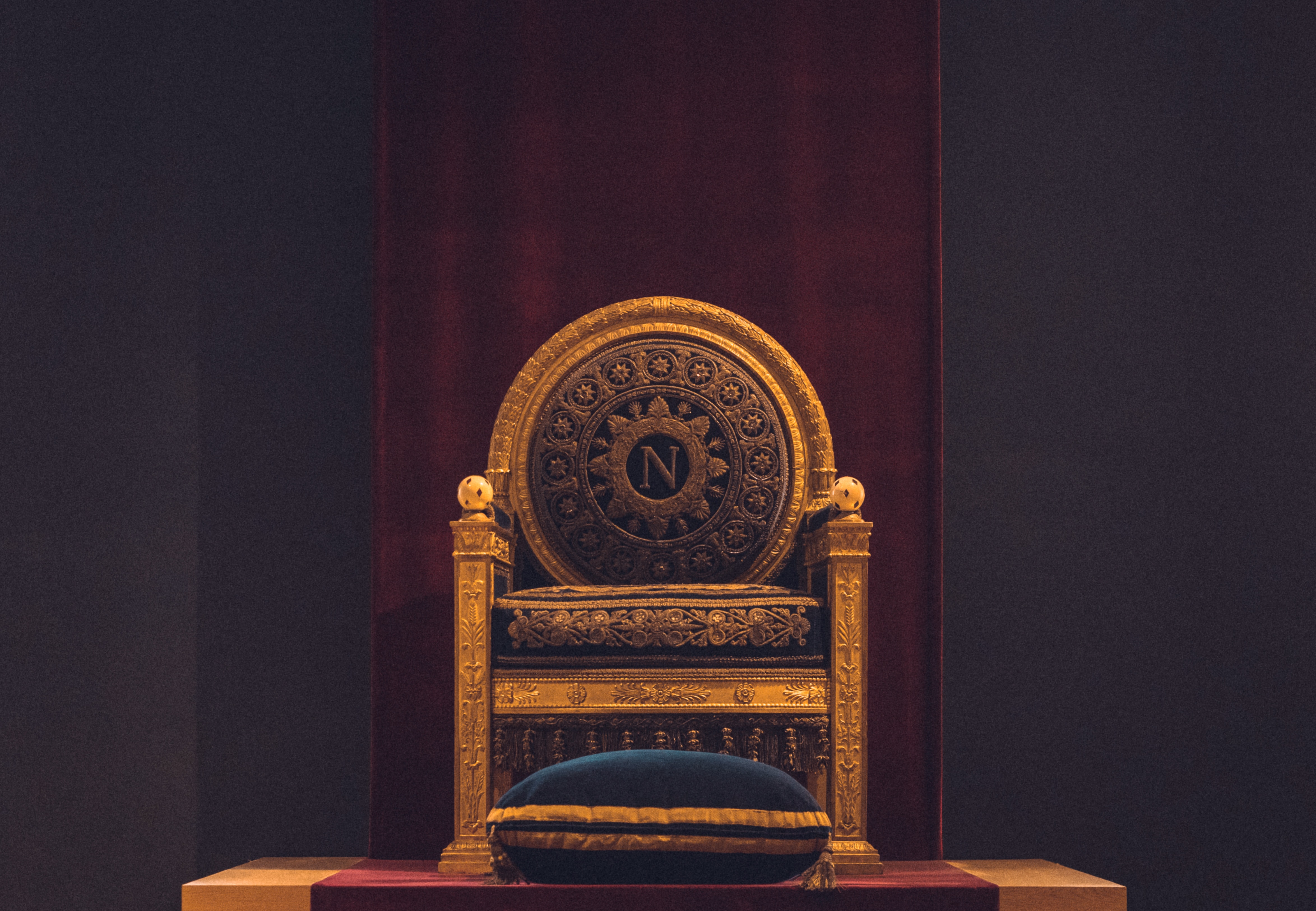Lumea va fi a celor creativi
A Whole New Mind – Why Right-Brainers Will Rule The Future is a very catchy title, a bit tabloid-y for my taste, but none the less one that intrigues you and urges you to find out more about the mysterious book.
The first thing you notice about it is that it is not like most self-development books that almost slap you across the face with advice on“how to” or “what to do” to achieve this and that – how to change the way you think or see the world or what not. It does not bore you with infinite details of laborious studies that half put you to sleep. It does give you a not too short but not too long introduction on “The Conceptual Age” in order to better understand the bulk of the book, what it is that pleads for the use of the right hemisphere of the brain and why it will dominate in all fields of life in the near future.
 The second part of the book is the one that excites you and puts a smile upon your face in a way that you would never expect a book of this sort to do. The subject is called “The Six Senses” which have nothing to do with what we usually call “senses”. It talks about design, story, symphony, empathy, play and meaning. It basically restructures the way you see the world without doing very much or doing something invasive to your way of thinking.
In design Pink explains why having a product that fulfils a need is not enough anymore if it does not communicate something else beside an aesthetic point of view. He talks, for example, about toasters and the need to have pretty toasters since about 90% of the time they just sit on the kitchen counter top and just look nice. Story emphasizes the need of integrating stories into every single thing we do and how that makes of us better doctors, managers and ultimately people. Sure, some of us are blessed with an extraordinary memory in which we store significant amounts of information that is easily used by our analytical, logical way of thinking (also known as the left side of the brain or L-Directed Thinking), but most of us get lost in the maze of data.
So stories help us not only to better remember things, but also to integrate all that useful information in a way that is not boring and that helps us see the bigger picture. And that is what symphony is all about – the bigger picture, the integrated picture in which all of the pieces of the puzzle come together to form something more universal, easier to understand and ultimately something that trumps logic or analysis and gets past their hang-ups or limitations. It broadens our horizon of reason and thinking.Empathy is essential because we cannot think about designing a new product or coming up with a solution to a problem if we cannot empathize with our customer or the context of the problem. Play is about finding new ways to see old ideas. You can develop new skills or talents just by playing a video game that engages you in a way that a theoretical or classical approach to learning never will. As Pat Kan so aptly put it, “Play will be to the 21st century what work was to the last 300 years of industrial society – our dominant way of knowing, doing and creating value”. Last but not least in the book is meaning, which in the words of the author as well as other respected writers is what life is all about – finding something meaningful that pushes you forward.
The second part of the book is the one that excites you and puts a smile upon your face in a way that you would never expect a book of this sort to do. The subject is called “The Six Senses” which have nothing to do with what we usually call “senses”. It talks about design, story, symphony, empathy, play and meaning. It basically restructures the way you see the world without doing very much or doing something invasive to your way of thinking.
In design Pink explains why having a product that fulfils a need is not enough anymore if it does not communicate something else beside an aesthetic point of view. He talks, for example, about toasters and the need to have pretty toasters since about 90% of the time they just sit on the kitchen counter top and just look nice. Story emphasizes the need of integrating stories into every single thing we do and how that makes of us better doctors, managers and ultimately people. Sure, some of us are blessed with an extraordinary memory in which we store significant amounts of information that is easily used by our analytical, logical way of thinking (also known as the left side of the brain or L-Directed Thinking), but most of us get lost in the maze of data.
So stories help us not only to better remember things, but also to integrate all that useful information in a way that is not boring and that helps us see the bigger picture. And that is what symphony is all about – the bigger picture, the integrated picture in which all of the pieces of the puzzle come together to form something more universal, easier to understand and ultimately something that trumps logic or analysis and gets past their hang-ups or limitations. It broadens our horizon of reason and thinking.Empathy is essential because we cannot think about designing a new product or coming up with a solution to a problem if we cannot empathize with our customer or the context of the problem. Play is about finding new ways to see old ideas. You can develop new skills or talents just by playing a video game that engages you in a way that a theoretical or classical approach to learning never will. As Pat Kan so aptly put it, “Play will be to the 21st century what work was to the last 300 years of industrial society – our dominant way of knowing, doing and creating value”. Last but not least in the book is meaning, which in the words of the author as well as other respected writers is what life is all about – finding something meaningful that pushes you forward.
 Aside from all the lovely examples that you find along the book, what I appreciated most and am most grateful for is the Portfolio part at the end of each chapter in which the author gives examples of methods, exercises, books, music or whatnot that can better illustrate what he just talked about in that chapter and how you can use it to discover your own talents or apply what you have read. So for me, the fact that this book went beyond theory and case studies is what made it a truly exceptional book. I did not feel weighed down by meaningless information, which, let’s be honest, won’t stick to my or your memory for too long, but I did feel enlightened at the end, after many book suggestions and websites to be checked out.
I highly recommend this book because, even though you feel the „American way” of its writing, it is in no way superficial or superfluous. He is also the author of other very good books on diferent subjects which you can find here.
Aside from all the lovely examples that you find along the book, what I appreciated most and am most grateful for is the Portfolio part at the end of each chapter in which the author gives examples of methods, exercises, books, music or whatnot that can better illustrate what he just talked about in that chapter and how you can use it to discover your own talents or apply what you have read. So for me, the fact that this book went beyond theory and case studies is what made it a truly exceptional book. I did not feel weighed down by meaningless information, which, let’s be honest, won’t stick to my or your memory for too long, but I did feel enlightened at the end, after many book suggestions and websites to be checked out.
I highly recommend this book because, even though you feel the „American way” of its writing, it is in no way superficial or superfluous. He is also the author of other very good books on diferent subjects which you can find here.
 The second part of the book is the one that excites you and puts a smile upon your face in a way that you would never expect a book of this sort to do. The subject is called “The Six Senses” which have nothing to do with what we usually call “senses”. It talks about design, story, symphony, empathy, play and meaning. It basically restructures the way you see the world without doing very much or doing something invasive to your way of thinking.
In design Pink explains why having a product that fulfils a need is not enough anymore if it does not communicate something else beside an aesthetic point of view. He talks, for example, about toasters and the need to have pretty toasters since about 90% of the time they just sit on the kitchen counter top and just look nice. Story emphasizes the need of integrating stories into every single thing we do and how that makes of us better doctors, managers and ultimately people. Sure, some of us are blessed with an extraordinary memory in which we store significant amounts of information that is easily used by our analytical, logical way of thinking (also known as the left side of the brain or L-Directed Thinking), but most of us get lost in the maze of data.
So stories help us not only to better remember things, but also to integrate all that useful information in a way that is not boring and that helps us see the bigger picture. And that is what symphony is all about – the bigger picture, the integrated picture in which all of the pieces of the puzzle come together to form something more universal, easier to understand and ultimately something that trumps logic or analysis and gets past their hang-ups or limitations. It broadens our horizon of reason and thinking.Empathy is essential because we cannot think about designing a new product or coming up with a solution to a problem if we cannot empathize with our customer or the context of the problem. Play is about finding new ways to see old ideas. You can develop new skills or talents just by playing a video game that engages you in a way that a theoretical or classical approach to learning never will. As Pat Kan so aptly put it, “Play will be to the 21st century what work was to the last 300 years of industrial society – our dominant way of knowing, doing and creating value”. Last but not least in the book is meaning, which in the words of the author as well as other respected writers is what life is all about – finding something meaningful that pushes you forward.
The second part of the book is the one that excites you and puts a smile upon your face in a way that you would never expect a book of this sort to do. The subject is called “The Six Senses” which have nothing to do with what we usually call “senses”. It talks about design, story, symphony, empathy, play and meaning. It basically restructures the way you see the world without doing very much or doing something invasive to your way of thinking.
In design Pink explains why having a product that fulfils a need is not enough anymore if it does not communicate something else beside an aesthetic point of view. He talks, for example, about toasters and the need to have pretty toasters since about 90% of the time they just sit on the kitchen counter top and just look nice. Story emphasizes the need of integrating stories into every single thing we do and how that makes of us better doctors, managers and ultimately people. Sure, some of us are blessed with an extraordinary memory in which we store significant amounts of information that is easily used by our analytical, logical way of thinking (also known as the left side of the brain or L-Directed Thinking), but most of us get lost in the maze of data.
So stories help us not only to better remember things, but also to integrate all that useful information in a way that is not boring and that helps us see the bigger picture. And that is what symphony is all about – the bigger picture, the integrated picture in which all of the pieces of the puzzle come together to form something more universal, easier to understand and ultimately something that trumps logic or analysis and gets past their hang-ups or limitations. It broadens our horizon of reason and thinking.Empathy is essential because we cannot think about designing a new product or coming up with a solution to a problem if we cannot empathize with our customer or the context of the problem. Play is about finding new ways to see old ideas. You can develop new skills or talents just by playing a video game that engages you in a way that a theoretical or classical approach to learning never will. As Pat Kan so aptly put it, “Play will be to the 21st century what work was to the last 300 years of industrial society – our dominant way of knowing, doing and creating value”. Last but not least in the book is meaning, which in the words of the author as well as other respected writers is what life is all about – finding something meaningful that pushes you forward.
 Aside from all the lovely examples that you find along the book, what I appreciated most and am most grateful for is the Portfolio part at the end of each chapter in which the author gives examples of methods, exercises, books, music or whatnot that can better illustrate what he just talked about in that chapter and how you can use it to discover your own talents or apply what you have read. So for me, the fact that this book went beyond theory and case studies is what made it a truly exceptional book. I did not feel weighed down by meaningless information, which, let’s be honest, won’t stick to my or your memory for too long, but I did feel enlightened at the end, after many book suggestions and websites to be checked out.
I highly recommend this book because, even though you feel the „American way” of its writing, it is in no way superficial or superfluous. He is also the author of other very good books on diferent subjects which you can find here.
Aside from all the lovely examples that you find along the book, what I appreciated most and am most grateful for is the Portfolio part at the end of each chapter in which the author gives examples of methods, exercises, books, music or whatnot that can better illustrate what he just talked about in that chapter and how you can use it to discover your own talents or apply what you have read. So for me, the fact that this book went beyond theory and case studies is what made it a truly exceptional book. I did not feel weighed down by meaningless information, which, let’s be honest, won’t stick to my or your memory for too long, but I did feel enlightened at the end, after many book suggestions and websites to be checked out.
I highly recommend this book because, even though you feel the „American way” of its writing, it is in no way superficial or superfluous. He is also the author of other very good books on diferent subjects which you can find here. 







